"Weather Insurance" -- From Airlines?
The Wall Street Journal has an online article about new fees being charged by just about every airline with more to come. The article is here (subscription may be required). Something that caught my eye is that airlines are planning to offer weather insurance. Given how poorly airlines react to weather, it seems farfetched but apparently it is true. Here is what the Journal says:
I did a little research and found out more about the "weather insurance" product:
There is less to this than meets the eye. For example, lets assume you book a trip to Florida in March planning to escape the snows farther north and lay on the beach. What happens if a cold wave hits? No reimbursement. What happens if it is extremely windy (blowing sand, unpleasant to lay out)? No reimbursement. Finally, it says more rain "than average" during your trip. Florida is hardly a dry state and could rain 2 days out of five and not be above average.
Plus, the determination is made at the nearest weather station (which are at airports, not on beaches) which might not be reflective of the weather you experienced.
A far better strategy is to do what I do when planning a vacation: Book a resort that will experience the weather I want. With the increasing accuracy of weather forecasts, I often wait until about 5-7 days ahead to book the trip. While you might have a different experience, Kathleen and I have been doing this for years and have never once been disappointed.
Not paying the extra fee for "weather insurance" should offset all or part of any higher fares for waiting to book your trip.
Airsavings S.A., a Paris-based firm that creates products for airlines to sell, thinks the industry "is at the end of the road" for charging for once-free services, says CEO Raphael Bejar. Now, carriers' emphasis is shifting to new services that allow flyers to customize their travel, he says.
Airsavings offers weather insurance and runs a travel concierge service that consumers can buy on a per-trip basis. It recommends restaurants, arranges for theater tickets and re-books travel when necessary.
I did a little research and found out more about the "weather insurance" product:
Because of this inherent variability, and because most leisure travelers book their trips well ahead of reliable forecasts, financial indemnity against inclement weather presents a tantalizing market opportunity for operators in the global travel and tourism industry. One airline, Czech low cost carrier SmartWings, in partnership with ancillary revenue development leader Airsavings, is capitalizing on that market to its fullest, with an innovative program called MeteoBonus... MeteoBonus is a new-to-the-market service that allows travelers to protect their travel investment against weather disruption. Developed by Airsavings, Meteobonus provides customers booking with SmartWings (and eventually other carriers) to purchase financial assurance against both rainy weather and lack of sunshine. MeteoBonus is not trip insurance, however, which is designed to protect passengers from the unanticipated calamity. Rather, Meteonbonus a financial derivative created to help consumers hedge against the two most typical holiday-busters: rain and lack of sunshine. The MeteoBonus process is straightforward: a traveler buys the weather protection, and if more rain than average falls in their destination during their trip (or if less sunshine is recorded), a predetermined amount of money is automatically paid to them. Meteorological data is based on the nearest weather station to the destination, and corroborated by the World Meteorological Association. |
There is less to this than meets the eye. For example, lets assume you book a trip to Florida in March planning to escape the snows farther north and lay on the beach. What happens if a cold wave hits? No reimbursement. What happens if it is extremely windy (blowing sand, unpleasant to lay out)? No reimbursement. Finally, it says more rain "than average" during your trip. Florida is hardly a dry state and could rain 2 days out of five and not be above average.
Plus, the determination is made at the nearest weather station (which are at airports, not on beaches) which might not be reflective of the weather you experienced.
A far better strategy is to do what I do when planning a vacation: Book a resort that will experience the weather I want. With the increasing accuracy of weather forecasts, I often wait until about 5-7 days ahead to book the trip. While you might have a different experience, Kathleen and I have been doing this for years and have never once been disappointed.
Not paying the extra fee for "weather insurance" should offset all or part of any higher fares for waiting to book your trip.




Comments
Post a Comment